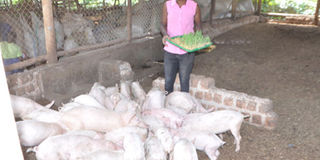She made Kampala a lucrative farmland

Gudula also keeps fish, pigs and chicken among other enterprises. Photo by Stephen Otage
The sudden appetite for land in Kampala, Wakiso and Mukono areas, has lately led to an onslaught on wetlands where all new investments such as factories, schools and churches seem to find space.
Engaging in large-scale agriculture in an urban area, is something which is almost unimaginable these days because it is assumed that the farm should have enough land to erect buildings to house the animals and birds among others.
However, Dr Gudula Naiga Basaza, a retired Information Communication Technology lecturer of Kyambogo University, has defied this myth.
She ventured into opening Gudie Leisure Farm. This was an idea of converting a swamp that neighboured them in Najeera in Kira Municipality, Wakiso District into an urban farming training institute to provide youth with skills.
Symbiotic mechanism
Her idea was to set up an all-round farm which does not generate waste. This meant setting up enterprise options that feed into each other. They include piggery, poultry, aquaculture and cunniculture.
Here, the litter from pigs is given to plants mainly spices and herbs which are grown in the flower pots for the nutrition needs of the students at the institute.
The waste from poultry, is given to fingerlings which are raised in the fish ponds. The ponds are covered with water hyacinth whose purpose is to clean up the ponds and it contains 43 per cent protein which is fed to the pigs.
According to Dr Gudula, the idea of the farm was that as one enterprise generates waste, it becomes an input to another enterprise such as the rabbits whose droppings and urine are used as pesticide and fertilisers.
Mixed farming
As one enters the farm, you are received by lush leisure gardens lined by vegetables, herbs and spices planted in used car tyres in what ordinarily would have been flower pots.
The leisure gardens are occasionally hired out to host events such as weddings and picnics as much as it doubles as a learning centre where people interested in this kind of urban farming go to learn a thing or two.
The gardens are situated on the drier side of the wetland which has a total of eight fish ponds where the fingerlings are being bred.
At the northern end of the farm is also a piggery with about 500 animals which are sold according to their body weight and the prevailing market price for pork.
Opposite it is the chicken brooder where trainees in poultry are taught how to plan for the poultry business in terms of the breeding of the birds, mating, value addition, feeding them and aspects like treatment and hygiene.
At the other end of the farm is the cunniculture section where rabbits are reared.
This section is very close to the conference facility where students in the farm get their theory lessons.
Dynamics of Gudie farm
According to Dr Gudula, when students enroll for school they are given start-up capital for the enterprises they choose to take.
Poultry has start-up capital of 500 birds, piggery has 50 piglets, Aquaculture 10,000 fingerlings and Cunniculture has 20 rabbits.
The farm gives the students all the inputs and knowledge required to raise the products.
This is so that the students get the practical skills to manage the particular enterprise.
When the products are sold off, they first calculate the amount of money which they injected into the entire project from feeds, treatment, cost for electricity and the labour which they subtract and the remaining profit all goes to the student.
This money is kept for the student as capital when they leave the training so that they have some start-up capital to embark on their selected project on their own.
Products
According to Prisca Ntakimanye, the horticulture manager, among products the farm produces are spinach, mint, dill, beet root, lavender, eggplant, strawberries, chives, cucumber, carrots, oregano, red pepper, coriander, green pepper and rosemary among others.
The farm also practices vermiculture, where earthworms are bred to feed chicken and pigs.
Resoil, the soil broken down by earth worms is sold to other farms as fertiliser to rejuvenate fertility of soils in farms that require it.
Biogas plant
Arthur Woniala an engineer at Kayinza Energy, an incubate enterprise at the farm, says his working with the farm has been very instrumental in making him realise his dream of setting up a biogas filling business.
Currently they are constructing a bio digester where they will be getting the biogas to pack in cylinders.
Model farm
The initiative which started in 2009, has today attracted several institutions which are partnering with the farm for various projects.
The Institute of Fisheries Training in Entebbe sends students there for internships.
The Private Sector Foundation of Uganda has also injected in money under the skills development facility to provide students with skills.
The National Agriculture Research Organization (Naro) is also using the facility for providing technical support in backstopping.
Bio innovate East Africa is also using the same farm to develop a mosquito repellent. So is Italian International NGO AVSI international which is using the facility to train 250 young people in skills for market linkages and agribusiness training.




